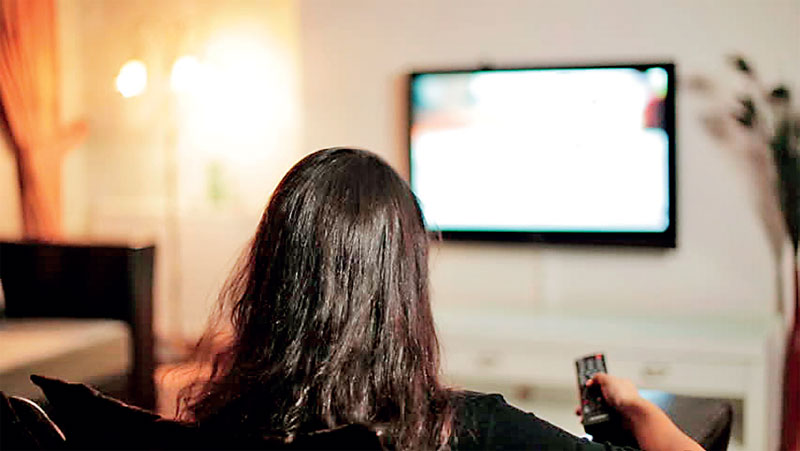Sunday Mar 01, 2026
Sunday Mar 01, 2026
Saturday, 16 October 2021 00:00 - - {{hitsCtrl.values.hits}}

Now alone at home, Aruni still sits in front of her TV following the late-night political discussions avidly
 Rupa and Aruni are two middle-aged sisters, placed in two very different realities by circumstances.
Rupa and Aruni are two middle-aged sisters, placed in two very different realities by circumstances.
Aruni, a spinster, lives here, in their ancestral home in a Colombo suburb, while the other, Rupa, migrated to Australia with her family about two decades ago. With her departure, the responsibility of looking after their elderly mother fell on Aruni, here in Sri Lanka.
For Rupa and family that was a new beginning; the couple who were professionally qualified found suitable employment, bought a large house in Melbourne, and settled down to a new immigrant life in the adopted country. Rupa was proud of her Melbourne house which was located in a highly residential area; the house came with a private bar and a pool table she said. I had no idea that they were interested in pool games, nor did I think they imbibed, not even an occasional glass of wine as far as I could remember.
Empowered by the new passport, she travelled to different countries, visiting Sri Lanka at least once every two years. Both her children grew up there; I believe they are now studying in Australian universities. Things had worked out well for Rupa; life had dealt her a good hand. Her happiness showed; she blossomed out, was vivacious and clearly took care of her appearance; dressing well, looking well. She carried herself with the confidence that is often visible in those living in an orderly and prosperous society.
When Rupa first went to Australia she was struck by the availability of things; she described the well-stocked shelves at the supermarkets with relish; meats of every kind and cut, vegetables of a wide range of colours and descriptions; and, relative to their wages, food was very affordable.
In this land of plenty, they ate well, perhaps too well the unaccustomed protein-rich diet; before long the couple, were showing signs of overindulgence. Recently, Rupa’s husband who is in his early 60s developed a murmur in the heart which needed careful medical attention.
At the Australian hospital, a tiny device was strapped to the husband’s body which monitors him round the clock. Twice a day he has to download an ECG report which he transmits to his cardiologist through the phone. Amazing from a Sri Lankan reality, every time there is a response from the cardiologist to the report, a few friendly encouraging words.
Meanwhile, Aruni in Sri Lanka devoted herself to looking after their mother, who grew feeble with age and was in effect bedridden. I gather she was difficult, a querulous invalid. Looking after her day after day was taxing, the stresses of nursing the old mother showed on Aruni, who grew increasingly grey and haggard. She rarely left their house, the TV was her only distraction, she followed the late-night political discussions with a noticeable eagerness.
Not as if she was particularly political, only that these tasteless political wrangles broke her otherwise unvarying days, took her mind to larger things: governments, mega projects, corruption. Watching the fake actors of our failed political drama every night, was like a drug that only reduced her. I noticed that she gradually became coarse, narrow and common; there was also a sadness about her, a sense of a person left behind.
Aruni’s life picks up noticeably during Rupa’s visits to Sri Lanka. The two sisters visit relatives, go shopping, even entertain. The house gets busy, looks brighter, there is activity, visitors drop by and occasionally I would catch a smile on Aruni’s face. All too soon it ends, Rupa returns to Australia, Aruni shrinks back into her routine.
Then came the COVID-19 pandemic. Although she was very concerned and monitored the situation from there, Rupa could not now travel to Sri Lanka. She urged Aruni, who rarely left their house, to get the vaccine; which she did, after standing in a long line. Then, for a lengthy period Aruni could not get her recommended booster; there was a muddle in obtaining the second injection at a governmental level.
The problem of getting their mother vaccinated came up presently. In her feeble state, standing in a queue was out of the question. There was a system which catered to such people, a telephone number to call, alas, permanently busy. After a few days of trying, Aruni finally got through to the number. The person who answered had taken her information in an abrupt sort of manner and then there was no further communication for a few days. Eventually there was a call from them, demanding further information, which Aruni dutifully provided. Then silence.
Meanwhile her mother who was in her 90s passed away of old age, as confirmed by the doctors. The cremation and the funeral rites were handled by a few family members who were present. This was about a month ago.
Until now there is no phone call from the authorities about the promised vaccination of the now deceased mother. Another promise, another insignificant telephone number disappearing in the bureaucratic gulag we have created.
Now alone at home, Aruni still sits in front of her TV following the late-night political discussions avidly. In some vague, complicated way, she imagines an explanation will come; an answer provided.